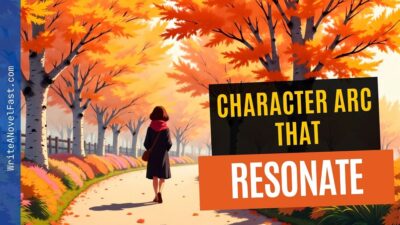Ever finish a book and find yourself thinking about the main character days later? That’s the magic of a good protagonist. Whether it’s Elizabeth Bennet’s sharp wit, Katniss Everdeen’s fierce loyalty, or Frodo Baggins’ quiet courage, these characters linger in our minds because they’re more than just story vessels — they feel real.
So, what makes a good protagonist? Let’s talk about that, not from a textbook standpoint, but like two writers chatting over coffee. Because at the heart of every unforgettable novel is a protagonist we care about — flaws, fears, messy arcs and all.
Table of content:
They’ve Got Something to Lose — And Something to Fight For
Let’s start here: a good protagonist wants something. Whether it’s saving their family, proving a point, discovering who they really are, or even just surviving another day — that goal gives their story purpose.
Think of Harry Potter. He doesn’t just battle Voldemort because he’s told to. He’s driven by grief, loyalty, and the need to protect the people he loves. His want — to belong, to do what’s right — keeps us turning the page.
What makes a good protagonist compelling is that their goal matters to them. The higher the stakes, the deeper our emotional investment as readers.
They’re Flawed — In the Best Way
Perfect characters are boring. You know the type — always making the right choice, always brave, always kind. But real people? We’re messy. And the best protagonists are too.
What makes a good protagonist shine is their imperfections. Maybe they’re impulsive. Maybe they push people away. Maybe they lie to themselves. But those flaws? That’s where growth lives.
Jo March (Little Women) is fiery and ambitious, but she’s also stubborn and temperamental. Sherlock Holmes is brilliant but emotionally distant and often dismissive. These flaws don’t make them unlikable — they make them human. why flaws make characters more satisfying and realistic – Check here
They Change, Even If Just a Little
One of the most satisfying things in fiction is watching a character grow. It doesn’t have to be a complete 180 — sometimes the most powerful changes are subtle.
Elizabeth Bennet (Pride and Prejudice) learns to challenge her assumptions. Zuko (Avatar: The Last Airbender) transforms from a bitter antagonist into a hero with heart. What makes a good protagonist isn’t just who they are at the start, but who they become by the end.
This transformation is called a character arc — and it’s one of the most essential tools in your storytelling kit.
In My Own Experience, I Found That…
…writing protagonists used to intimidate me. I’d spend hours outlining plot twists and dialogue, only to end up with a cardboard cutout instead of a breathing, bleeding character. It wasn’t until I stopped trying to make them “likeable” and started asking, “What are they scared of?” and “What lie do they believe about themselves?” that things started to click.
If you’re struggling, my friendly advice is this: let your protagonist be vulnerable. Let them screw up. Let them long for things they can’t admit out loud. Readers won’t fall in love with perfection — they’ll fall in love with truth.
They Drive the Story Forward
One huge mistake writers make (and yep, I’ve been there) is creating protagonists who react to everything but rarely act. But what makes a good protagonist unforgettable is their sense of agency. They make choices. Sometimes bad ones. But those choices propel the plot forward.
Let’s go back to Katniss in The Hunger Games. She doesn’t just end up in the arena — she volunteers. That single decision defines her arc, her relationships, and the entire rebellion.
Even in quieter stories, protagonists still need agency. In The Fault in Our Stars, Hazel chooses to open her heart, knowing full well the risk of love and loss. That’s power. That’s movement.
They Make Us Feel
Here’s a secret ingredient: emotion. A good protagonist doesn’t have to be heroic — they just need to matter to the reader. We want to cry with them, laugh at their awkward moments, yell at them when they mess up, and cheer when they get back up again.
Offred in The Handmaid’s Tale evokes fear and empathy. Ove in A Man Called Ove starts out as grumpy and unlikable, but by the end, he’s stolen our hearts.
What makes a good protagonist resonate isn’t how cool or tough they are. It’s their humanity. When a character reminds us of ourselves — or someone we love — we don’t just read the story. We live it.
So… What Makes a Good Protagonist?
Let’s recap, friend to friend.
A good protagonist:
- Has a clear goal (and stakes that make us care)
- Is flawed in ways that feel honest
- Grows or changes over time
- Drives the story through their choices
- Makes readers feel something deep
The best part? There’s no single formula. Your protagonist doesn’t have to save the world or be the bravest person in the room. They just need to be real — and written with heart.
So go ahead. Give them something to want. Let them stumble. Let them rise. And trust that if you care about them, readers will too.
FAQ: What Makes a Good Protagonist
Q1: Can a protagonist be unlikable?
Absolutely. As long as they’re interesting and layered, readers will stick with them. Think of characters like Tony Stark or Lisbeth Salander.
Q2: Does my protagonist need a big goal?
Not necessarily. It just needs to matter deeply to them. Whether it’s finding a lost sibling or healing from grief, emotional stakes are key.
Q3: Can I have more than one protagonist?
Sure! Dual protagonists can work well (like in The Night Circus or Six of Crows), but make sure each one has a full arc.
Q4: What’s more important — plot or protagonist?
Both matter, but if readers don’t connect with your protagonist, they won’t care what happens. Character fuels connection.



